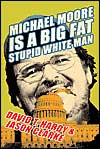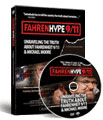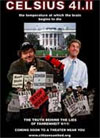Joey Tartakovsky: "As a polemic, masterful; as a basis for informed decision-making, irresponsible."
No one has challenged Michael Moore's right to "reveal" the consequences of President Bush's decisions as brutally as he wants. But this is not what he does. He seeks to embarrass Bush by culling choice footage from hundreds of hours of recording, cutting-and-pasting them in unflattering ways, and then spicing it with wild innuendo and cinematic manipulation. If any one of us were on camera on a daily basis, speaking on record about a half-dozen issues, we'd have quite a blooper reel as well. Fahrenheit 9/11's unforgiving character assassination is corrosive to civil democratic culture. If everyone behaved this way towards their political opponents, and if every important issue were simplified to the point of absurdity, normal political processes would break down. Fahrenheit 9/11 thus resorts to the oldest, nastiest trick in the book: attack Bush's character, not his policies; impugn his motives, not his arguments. It's hard to ignore how relentlessly personal this movie is. All this, even as there remain few matters more in demand of partisan discretion and common decency than terrorism and war. . . .
As a polemic, Fahrenheit 9/11 is masterful; as a basis for informed decision-making, it is irresponsible. The thought that Fahrenheit 9/11's dishonorable message might actually become a basis for individuals to make decisions is the most disconcerting part of all.
Source: Joey Tartakovsky. July 28, 2004.





|